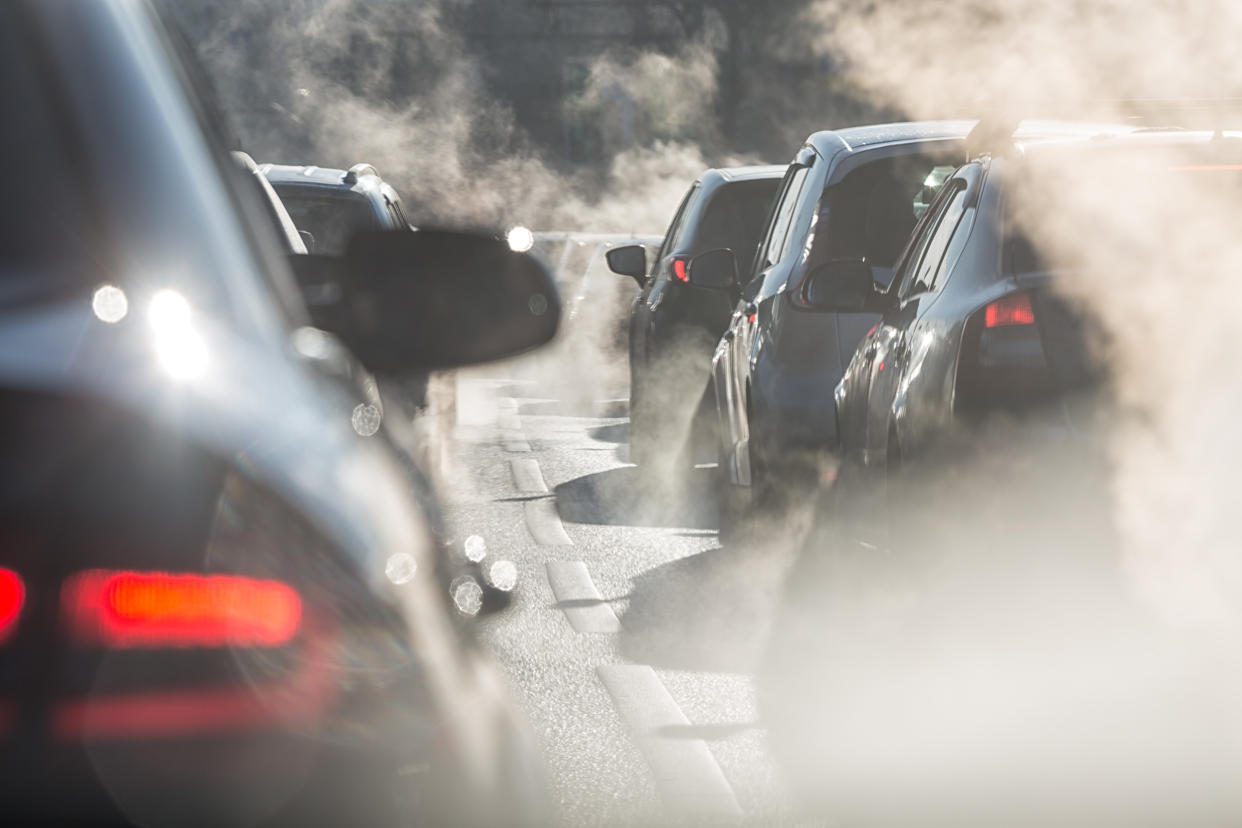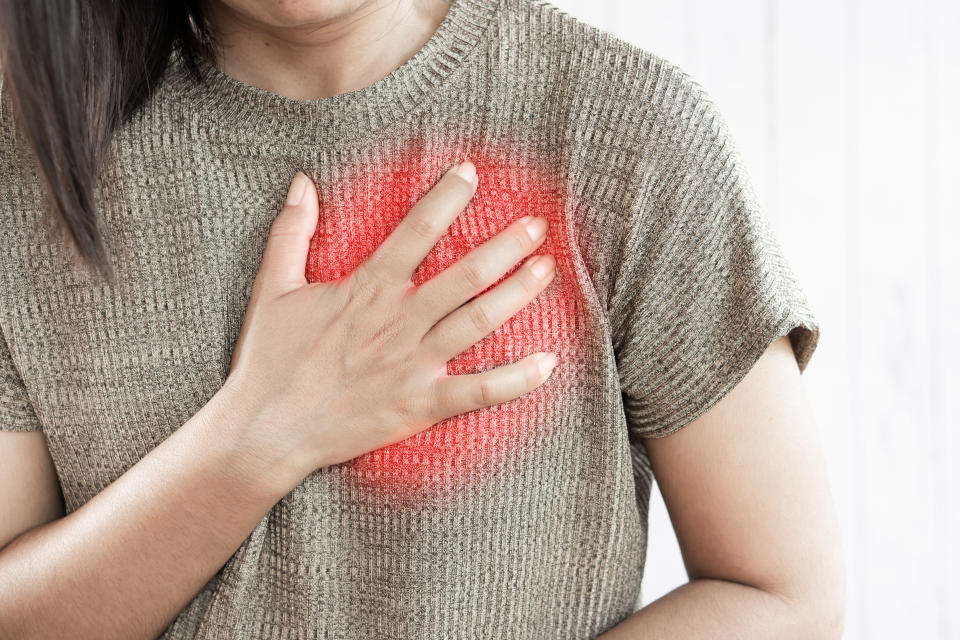Air pollution triggers over 100 cardiac arrests a year - here's how to protect yourself

Air pollution triggers more than 100 cardiac arrests a year in England, research suggests.
Scientists from King’s College London looked at the air quality of nine major cities, including Birmingham, Liverpool and Manchester.
This was compared against the number of ambulance call outs for patients suffering a cardiac arrest. This occurs when the heart suddenly stops beating, causing the brain to be starved of oxygen.
The scientists found an extra 124 cardiac arrests occur every year across England as a result of air pollution being higher than normal. The “health emergency” was also linked to an additional 231 strokes and 193 asthma hospitalisations.
Those living near a main road may be most at risk. The scientists found dwelling within 50m of a busy street raises the risk of a stroke, low birthweight and reduced lung capacity in children.
Inhaling tiny particles and gases in the air has been shown to damage the inside of the arteries, making them narrow and stiff. It may also cause blood to clot and disrupt the electrical impulses that maintain a steady heart beat.
Off the back of this research, Yahoo UK asked experts how we can protect ourselves from air pollution.

Speaking of the results, NHS England boss Simon Stevens, said: "As these new figures show, air pollution is now causing thousands of strokes, cardiac arrests and asthma attacks, so it’s clear the climate emergency is in fact also a health emergency.
“Since these avoidable deaths are happening now - not in 2025 or 2050 - we need to act now."
Air pollution has been linked to everything from asthma and heart disease to lung cancer and even premature death.
Public Health England calls low air quality the “largest environmental risk to public health in the UK”.
To learn more, the King’s scientists compared air pollution with ambulance call outs in London, Birmingham, Bristol, Derby, Liverpool, Manchester, Nottingham, Oxford and Southampton. They did not look at health scares suffered by patients already in hospital.
Results suggest that in London alone, “high-pollution days” trigger an extra 87 (2.2%) cardiac arrests a year. When air quality is at its worst, the capital also sees an additional 144 (2.7%) strokes, as well as an extra 74 children and 33 adults ending up in hospital with asthma.
The scientists also looked at how proximity to a busy road affects a person’s stroke risk. In the capital, they found living within 50m of a busy street raises the odds of being hospitalised for stroke by 6.6%.
“Pollution is directly proportional to the amount of traffic on the road,” Chris Large, senior partner at Global Action Plan, told Yahoo UK.
In Birmingham, 12 (2.3%) more cardiac arrests, 27 (2.6%) strokes and 26 asthma exacerbations occur every year when air pollution is at its worst, the research found. Living near a main road increases a dweller’s stroke risk by 4%.
Between two and six additional cardiac arrests take place in Bristol, Liverpool, Manchester, Nottingham, Oxford and Southampton when emissions are high, with there also being up to 14 extra admissions for stroke and asthma.
Derby was the only city analysed to have no additional cardiac arrests on “high-pollution days”.
READ MORE: Protecting yourself against air pollution
In terms of stroke, living near a main road raises the risk by 7.4% in Oxford, 3.9% in Derby, 2.8% in Bristol, 2.4% in Liverpool, 2% in Southampton and 1.5% in Nottingham. Data was not available for Manchester.
The research also linked air pollution to reduced lung capacity in children. This was worst in London, with poor air quality raising the risk by 12.5%. Youngsters who grow up near busy roads in the capital were found to be 8.7% more at risk than those living away from main streets.
Busy roads may also be risky for pregnant women. The scientists found the odds of having a low birthweight baby rises by up to 0.4% for those living near main streets in Birmingham, Bristol, Nottingham, Oxford and Southampton.
By damaging the blood vessels, air pollution may increase blood pressure and put additional strain on the heart, according to the British Heart Foundation.
Pollutants from traffic fumes can also irritate the airways, triggering asthma, Asthma UK states.
How to protect yourself against air pollution
Speaking to Yahoo UK, Mr Large recommends people protect themselves by checking the daily air pollution forecast in their area.
In the UK, the Department for Environment Food & Rural Affairs allows people to look up the level of nitrogen dioxide, sulphur dioxide and particulate matter (PM) in their region. PM is emitted by diesel vehicles and is small enough to enter the lungs.
DEFRA colour codes pollutant levels according to a low or high risk.
“On days when it’s higher than average, pregnant women and those with heart or lung conditions are advised to reduce their outdoor exercise,” Mr Large told Yahoo UK. “It’s quite rare it’s that bad; maybe five-to-10 days a year.”
Day-to-day, people can reduce their exposure by avoiding busy roads where possible.

“Taking the back street can reduce the pollution someone is exposed to by 50%,” Mr Large said.
Perhaps surprisingly, opting to walk rather than drive can also reduce the amount of emissions a person inhales.
“Air pollution in a car is often much higher than walking or cycling; sometimes it’s 10 times higher,” Mr Large said.
“You think if you’re inside you’re protected but the pollution comes in from the vehicle in front’s exhaust pipe and it builds up because there is no open air.”
READ MORE: 5 things you didn’t realise air pollution could impact
In our homes, Mr Large recommends we keep the air circulating as much as possible.
“Use the extractor fan, even if cooking from a gas or electric hob,” he said. “Pollutants come off the hob surface.
“And make sure you use fuel verified for wood burning, not random bits of wood broken off from an old cupboard.”
While we may not want to hear it, everyday items like candles, air fresheners and hairspray also pollute our homes.
“I don’t want to say ‘never use a candle ever again’, but it is a source of indoor air pollution,” Mr Large said. “Use them sparingly and cautiously.”
To prevent poor air building up, he also recommends we keep windows open during quieter times of the day.
“If you are next to a busy road, it’s probably best not to open the window during rush hour,” Mr Large said. “Wait until the traffic has died down and use windows that face away from busy roads.”
Changing our diet may also enable us to better fight off air pollution exposure.
“Fruits and vegetables contain antioxidants, which protect against air pollution,” study author Dr Heather Walton told Yahoo UK. “It’s not formally proven but it’s a good idea.
“You’re also probably more susceptible if you already have a health problem, so avoid fat in your diet to protect against heart disease.”
Polly Billington, director of UK100 - a network of government leaders, which was involved in the research - warns, however, an individual’s options are pretty limited.
“There is very little an individual can do,’ she told Yahoo UK. “We shouldn’t have to leave this to individuals to protect themselves from an invisible killer.
“There is action that can be made by the government now, like proper investment in public transport.”
King’s College released interim results ahead of the International Clean Air Summit on Wednesday, hosted by the Mayor of London Sadiq Khan. A full report will be published next month.
READ MORE: IKEA launches curtains that purify the air in your home
“London’s lethal air is a public health crisis - it leads to thousands of premature deaths in the capital every year, as well as stunting the development of young lungs and increasing cases of respiratory illness,” Mr Khan said.
"An issue as serious as this requires urgent innovative action which is why on top of bold measures likecleaning up our bus fleet, I’m hosting an International Clean Air Summit this week.
“We need government to introduce a legally binding target of meeting World Health Organization (WHO) guidelines by 2030 so we can clean up our filthy air once and for all.”
Areeba Hamid, senior climate campaigner at Greenpeace UK, told Yahoo UK: “The climate emergency and the health emergency are two sides of the same coin.
“Until our roads are no longer choked with dirty diesel and petrol vehicles, air pollution will continue to plague us with life threatening health conditions, as well as add fuel to the climate crisis.
“The success of the Ultra Low Emission Zone shows people are starting to change their habits. Now it’s the turn of the car manufacturers by getting polluting vehicles off the road all together by 2030.”


